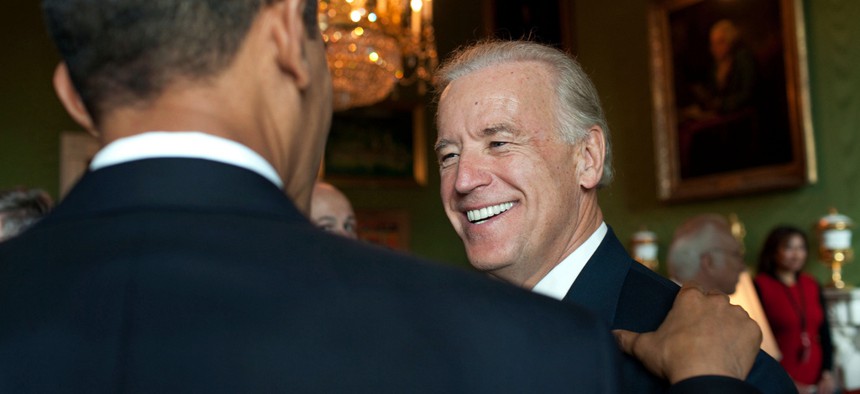
White House file photo
Joe Biden Comes to Fix Fissures Between Obama and Republicans
The vice president can take advantage of strong relationships with the Senate GOP, but only "if they let him loose."
Democrats' dramatic loss of the Senate in November may have made one of their own an unlikely winner—Joe Biden. But it remains to be seen whether the White House will let him off the bench and into the game.
The vice president sits in a unique position to serve as a broker between President Obama and incoming Senate Majority Leader Mitch McConnell, and help locate that so-far elusive "common ground" that Obama has talked about since the midterm election.
"I think the vice president's been somebody who at least we can talk to. It's hard to find anybody to answer your phone calls over at the White House or to be a negotiating partner," says Sen. John Cornyn of Texas, soon to be the majority whip. "I think that offers a lot of promise if they let him loose, let him out of the closet."
The White House has identified issues such as global trade, tax reform, and rebuilding the nation's infrastructure as potential opportunities for compromise with the new Senate. Biden, who spent 35 years on the Hill and as vice president has already struck two 11th-hour budget deals with McConnell, could be a difference-maker on all of them. To Republicans, Biden retains a level of credibility that the president has lost, and he and McConnell have a relationship that dates back decades.
"The only person on the face of the Earth who has the trust of [John] Boehner, McConnell, and the president is the vice president," says Ted Kaufman, the former senator from Delaware who was Biden's longtime chief of staff on Capitol Hill. "Trust is what makes legislation happen."
Success would come with an added political benefit along the way. If Biden can help forge some bipartisan accords, he would burnish his credentials as a possible 2016 presidential candidate. The current wisdom in Washington remains that the vice president won't run if Hillary Clinton does, but should Clinton demur, all bets are off. Biden would slide into the role of the reigning establishment Democrat. Hammering out deals with the GOP—something voters say they're eager for—would buttress that position.
And even if he doesn't run, Biden would close out his government service on a high note, with a tangible relevance that eludes some vice presidents.
The White House perhaps began to recognize the new and more pragmatic political environment Thursday, when it expressed support for the omnibus funding bill being debated in the House over the alarmed objections of Minority Leader Nancy Pelosi of California and other liberals. As prospects for its passage became increasingly uncertain, Biden was personally making calls to cajole reluctant House Dems into voting for the measure.
Still, a White House aide said it would be a mistake to believe that Biden, or any one figure, can serve as a magic talisman to reconcile the two warring sides. "We are more focused on substance and issues of shared concern and priorities than on personalities," the aide says. "Relationships matter, but the first order of business with Republicans is shared priorities, not which administration official is making the call or hosting the meeting."
The vice president has been more or less on the legislative sidelines since the fall of 2013, when Senate Majority Leader Harry Reid reportedly shut Biden out of talks to end the government shutdown. Two years earlier, the vice president had been instrumental in ending an impasse and striking a deficit-reduction deal with McConnell over raising the federal debt limit. Then, on New Year's Eve in 2012, after talks had gone nowhere for weeks, Biden and McConnell took over and averted the so-called fiscal cliff. Reid and other Senate Democrats felt Biden had given up too much in those deals.
But the dynamic is about to shift. "Harry Reid is no longer the top dog. The room will now consist of McConnell, Biden, and Boehner," says John Feehery, a former top Republican aide in the House, describing a scenario at which Reid would surely scoff.
Biden's involvement, Feehery says, would help bring other Democrats along. "He has an appreciation of what it takes to make a deal," he says, "more so than the president."
The vice president has made upgrading the nation's infrastructure a policy priority. Just last month, he appeared at the port in Houston, advocating for renewed investment in fixing the nation's ports, roads, and bridges. (McConnell echoed those concerns this week.) He's also served as an ambassador for free trade. In the Senate, he voted for the North American Free Trade Agreement in 1993. The White House is pressing for Congress to give Obama fast-track authority for the Trans-Pacific Partnership, which would ease trade barriers among 12 Pacific Rim countries, something ardently opposed by progressives.
In addition, Biden's background as chairman of the Senate Foreign Relations Committee could prove valuable as Congress is expected early next year to debate whether to formally authorize U.S. military action in Syria and Iraq.
But as the White House points out, Biden's involvement doesn't guarantee compromise. There are plenty of incentives, heading into 2016, for both sides to stay apart. While Republicans want to show voters they can govern, they're also wary of working with an unpopular administration; they might prefer to send bills up for Obama to veto. Democrats are determined to retain the presidency and retake the Senate, believing the best way of doing so is by portraying Republicans as out-of-touch obstructionists.
And, somewhere in between, the vice president will be fighting a personal battle—to stay relevant during an administration's final chapter.
This article appears in the December 12, 2014 edition of NJ Daily.







